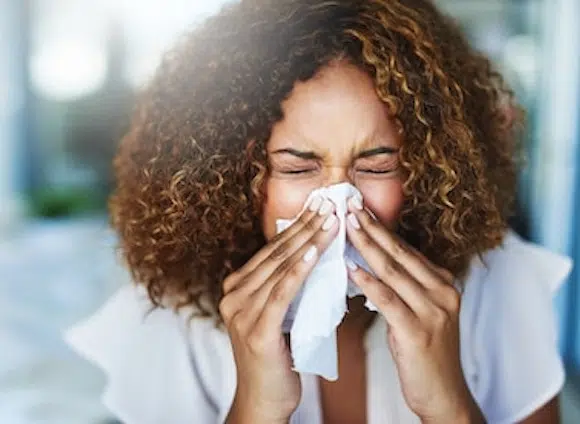What Is Allergic Rhinitis?
Allergic rhinitis is the diagnosis given to a collection of respiratory symptoms that result from exposure to an allergen. Though most commonly triggered by triggers such as dander or pollen, allergic rhinitis can, in some cases, result from food allergies.
There is a non-allergic variant, as well. Those with non-allergic rhinitis react to irritants in an environment, such as smoke.
It can be easy to confuse allergic rhinitis with other respiratory ailments. For example, allergic rhinitis may resemble sinusitis, in some ways, but these are very different conditions.
Sinusitis is an infection of the sinus cavities caused by a virus or a bacteria and comes in acute and chronic forms. Allergic rhinitis results from the release of histamines in the body in response to an allergen trigger.
01
Causes
The primary cause of most cases of allergic rhinitis is inhaling tiny particles of an airborne allergen. In some cases, ingesting a food allergen can cause allergic rhinitis.
02
Diagnosis
Diagnosing allergic rhinitis is a multi-step process and can involve a number of medical professionals, including a GP and an allergist. The diagnostic process typically involves a physical exam, a thorough medical history and various tests. The two most common tests used to test for allergic rhinitis are skin tests and the IgE antibody test. The skin test involves exposing an area of the skin to an allergen, then pricking it and waiting to see if the skin has a reaction. An IgE antibody test involves taking a blood sample from the patient. The patient’s blood is then exposed to allergens in a laboratory; the blood is then tested to see if its levels of IgE antibodies have increased in response to the allergy trigger.
03
Treatment
Treatment for allergic rhinitis involves a number of interventions, including lifestyle and environmental changes done in tandem with medications. Patients should work closely with their allergist to develop a treatment plan that works specifically for their needs.

Types of Allergic Rhinitis
There are two main types of allergic rhinitis that AllerVie can treat: perennial allergic rhinitis and seasonal allergic rhinitis.
Seasonal rhinitis, often referred to as ‘hay fever’, occurs during the time of year when a certain trigger, such as ragweed, is present in the patient’s environment.
Perennial rhinitis happens throughout the year and is triggered by constants in an environment, such as pet dander or dust mites.
Risk Factors for Allergic Rhinitis
Patients with asthma or eczema
Patients with a parental history of rhinitis
Obese patients
Patients exposed to parental smoking
Patients exposed to pets and animals
Atopic patients with more than one allergy

Treatments for Allergic Rhinitis
A primary line of defense against allergic rhinitis involves implementing control and prevention measures in a patient’s environment. For example, if a patient is allergic to dust mites, they will need to maintain their home and work environments to limit their exposure to the allergen.
In addition to environmental changes, doctors may also recommend any of the following medications to treat allergic rhinitis:
- Antihistamines
- Decongestants
- Eye drops
- Nasal Sprays
- Immunotherapy
Some people have had success with home treatments like probiotics and herbal extracts, but they shouldn’t be used instead of a medical plan. It is best for people with allergic rhinitis to follow their treatment instructions to get the best results.

Can Allergic Rhinitis Be Prevented?
The best line of defense against any allergic reaction is to limit patient exposure to the allergy trigger. It is not possible to prevent allergic rhinitis entirely, but lifestyle changes and changes to one’s environment can control and limit exposure to allergens.
Patients who have seasonal allergies and cannot avoid exposure to allergens can take certain medications on a daily basis to reduce their eventual symptoms. The use of any medications used to prevent allergic rhinitis should be done in close consultation with a physician or allergist.


